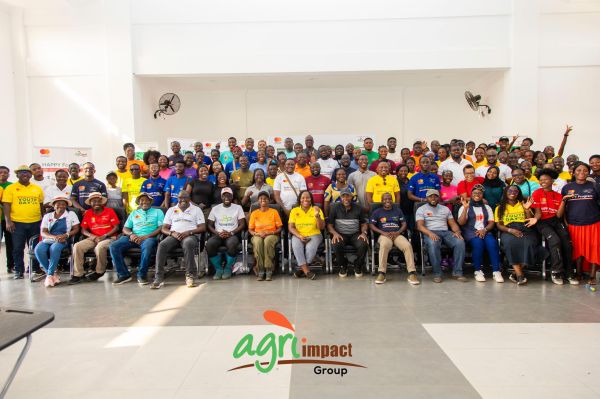Nearly 100,000 young Ghanaians have found sustained employment in agriculture through the HAPPY (Harnessing Agricultural Productivity and Prosperity for Youth) Programme, a pioneering initiative by the Mastercard Foundation in partnership with the agribusiness leader Agri-Impact Group.
Launched in December 2023, the HAPPY Programme aims to transform Ghana’s agricultural sector by focusing on four key value chains: rice, soybeans, tomatoes, and poultry where Ghana currently relies heavily on imports.
The initiative seeks to reduce Ghana’s reliance on food imports, boost self-sufficiency, and create economic opportunities for youth aged 15 to 35, with a special focus on women and persons with disabilities (PWDs), who comprise 70% of the programme’s beneficiaries.
Speaking at the Kasunya Economic Enclave exhibition, Mr Daniel Acquaye, Group CEO of Agri-Impact Group, celebrated the programme’s milestones and outlined its goals.
“Our aim is to create 326,000 jobs for young people by 2027. To date, close to 100,000 have secured jobs within these essential value chains,” Mr Acquaye announced, highlighting the programme’s contribution to local production and job creation.
By fostering domestic production, the Group CEO of Agri-Impact Group added that the HAPPY Programme was set to produce 189,000 metric tonnes of food annually, which could reduce food imports by 10% each year and generate approximately $200 million in income for young Ghanaians.
Currently, he said that the programme was being undertaken in 13 out of 16 regions in the country, adding that as it continued to grow, inclusivity remained central, with significant efforts to empower women and PWDs.
As the HAPPY Programme looks to the future, Mr Acquaye expressed confidence in its potential.
“We are looking to create an additional 130,000 jobs by the end of 2025,” he said, noting that the programme was tackling challenges such as land access, technology, and finance to make agriculture an appealing career for Ghana’s youth.
The HAPPY Programme, he noted plans to expand to other regions, with exhibitions scheduled for Sunyani and Kumawu. At Kumawu, where 20,000 acres have been allocated by the Omanhene of Kwamu, the National Service Scheme would provide young people with resources and training in tomato and rice production.
He noted that the programme’s sustainability was driven by eight implementing partners, including NewAge Agric Solutions, National Service Scheme (NSS), Ghana CARES (MiDA), Ghana Enterprises Agency (GEA), Ministry of Food and Agriculture (MoFA), TechnoServe, Catholic Relief Services (CRS) and Jobberman which leveraged government infrastructure and private investments to secure lasting employment for the youth.
Among the programme’s notable successes, he indicated that NewAge Agric Solutions revitalized government-owned rice fields, increasing their capacity utilization from under 30% to an impressive 90%, with local brands like Evivi Rice now thriving in the market.
AgroKings, an anchor partner, has trained numerous young people, including women and PWDs, in rice production.
The company’s flagship product, Nana’s Rice, has grown in popularity, underscoring the impact of the HAPPY Programme.
The exhibition at Kasunya celebrated the achievements of young people who have embraced agriculture through the programme, showcasing their dedication and skill.
This year alone, 1,247 young people were trained at Kasunya, with 300 currently managing 390 hectares of rice.
Private sector investment is also increasing, with companies like Darko Farms establishing new processing facilities to supply 200,000 broilers monthly to retailers such as KFC, further supporting youth employment and local agriculture.
Reflecting on the programme’s impact on youth empowerment, Mr Acquaye noted that many participants had diversified their skills, branching into cashew processing, upcycling waste materials, and starting businesses in grilled chicken.
“We encourage participants to explore various income-generating activities, creating a diversified source of revenue and a resilient economic foundation,” he explained.
Mr Acquaye stressed that the HAPPY Programme remained apolitical, solely focused on empowering Ghanaian youth across backgrounds.
Madam Rica Rwigamba, Country Director of the Mastercard Foundation, emphasized that agriculture held immense potential to provide fulfilling work for youth, hence, the foundation’s resolve to empower 30 million young people in Africa to have dignified and fulfilling work by 2030.
Madam Rwigamba stressed that the HAPPY Programme designed to enable 326,000 young people in Ghana to have sustained work in the agriculture sector in the next four years, formed part of the Mastercard Foundation’s agenda to empower the youth, especially women in Africa.
“Many young people have transitioned from low-paying urban jobs to successful farming, gaining confidence and economic security,” she said.
Inclusivity is a cornerstone of the HAPPY Programme, with Chief Farmer Nana Owusu Achiaw of AgroKing noting that PWDs are integral to their operations, participating in roles across mechanization and warehouse management.
Additionally, he said that women are increasingly taking on tasks traditionally held by men, including operating tractors and excavators, which reflected a shift in perceptions about gender roles in agriculture.
Nana Owusu Achiaw disclosed that the HAPPY Programme had adopted an out-grower model, supporting smallholder farmers with technical assistance and a guaranteed market for their produce, provided they meet quality standards.
“This model has created a reliable income source for farmers, bolstered by support from AgroKing and agricultural extension officers,” he added.
Mr George Adomako, project manager for capacity-building and production under the MiDA Programme, the host of the HAPPY Programme, indicated that they were currently producing 2,500 acres of rice using 500 Ghanaian youth.
He added that the programme had trained 1,247 youth within the year the programme started.
“Out of these, we have selected 300 youths cultivating 2 hectares each, and they are in the field producing their rice. The first barge of 90 youths started in May, and they are now harvesting the rice they planted. The results from the field are encouraging and quite impressive,” he noted.
Source: Peacefmonline.com
| Disclaimer: Opinions expressed here are those of the writers and do not reflect those of Peacefmonline.com. Peacefmonline.com accepts no responsibility legal or otherwise for their accuracy of content. Please report any inappropriate content to us, and we will evaluate it as a matter of priority. |
Featured Video













